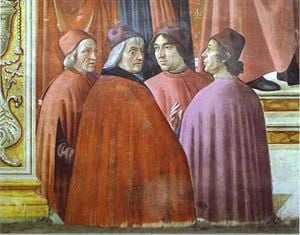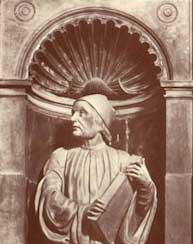Difference between revisions of "Marsilio Ficino" - New World Encyclopedia
Keisuke Noda (talk | contribs) (imported from wiki) |
m ({{Contracted}}) |
||
| Line 1: | Line 1: | ||
| + | {{Contracted}} | ||
[[Image:Zaccaria in the temple by dghirlandaio.jpg|thumb|300px|right|'''Domenico Ghirlandaio'''. 1486-1490. ''Zachariah in the Temple'' [detail]: Marsilio Ficino, Cristoforo Landino, Angelo Poliziano and Demetrios Chalkondyles (detail). Fresco. ''Santa Maria Novella, Tornabuoni Cappella, Florence, Italy.'']] | [[Image:Zaccaria in the temple by dghirlandaio.jpg|thumb|300px|right|'''Domenico Ghirlandaio'''. 1486-1490. ''Zachariah in the Temple'' [detail]: Marsilio Ficino, Cristoforo Landino, Angelo Poliziano and Demetrios Chalkondyles (detail). Fresco. ''Santa Maria Novella, Tornabuoni Cappella, Florence, Italy.'']] | ||
Revision as of 15:10, 9 August 2006
Marsilio Ficino (also known by his Latin name, Marsilius Ficinus) (Figline Valdarno, October 19 1433 - Careggi, October 1 1499) was one of the most influential humanist philosophers of the early Italian Renaissance, an astrologer, a reviver of Neoplatonism who was in touch with every major academic thinker and writer of his day, and the first translator of Plato's complete extant works into Latin. His Florentine Academy, an attempt to revive Plato's school, had enormous influence on the direction and tenor of the Italian Renaissance and the development of European philosophy.
Biography
During the sessions at Florence of the Council of Ferrara-Florence in 1438-1445, during the failed attempts to heal the schism of the Latin and Greek churches, Cosimo de' Medici and his intellectual circle had made acquaintance with the Neoplatonic philosopher George Gemistos Plethon, whose discourses upon Plato and the Alexandrian mystics so fascinated the learned society of Florence that they named him the second Plato. In 1459 John Argyropoulos was lecturing on Greek language and literature at Florence, and Marsilio became his pupil. When Cosimo decided to refound Plato's Academy at Florence, his choice to head it was Marsilio, who made the classic translation of Plato from Greek to Latin (published in 1484), as well as a translation of a collection of Hellenistic Greek documents of the Hermetic Corpus (Yates 1964), and the writings of many of the Neoplatonists, for example Porphyry, Iamblichus, Plotinus, et al. Following suggestions laid out by Gemistos Plethon, Ficino tried to synthesize Christianity and Platonism.
Marsilio Ficino's main original work was his treatise on the immortality of the soul (Theologia Platonica de immortalitate animae). In the rush of enthusiasm for every rediscovery from Antiquity, Marsilio exhibited a great interest in the arts of astrology, which landed him in trouble with the Roman Church. In 1489 he was accused of magic before Pope Innocent VIII and needed strong defense to preserve him from the condemnation of heresy.
His father was a physician under the patronage of Cosimo de' Medici, who took the young man into his household and became the lifelong patron of Marsilio, who was made tutor to his grandson, Lorenzo de' Medici. Giovanni Pico della Mirandola, the Italian humanist philosopher and scholar was another of his students.
Marsilio Ficino, writing in 1492, proclaimed, "This century, like a golden age, has restored to light the liberal arts, which were almost extinct: grammar, poetry, rhetoric, painting, sculpture, architecture, music...this century appears to have perfected astrology."
His letters, extending over the years 1474 – 1494, survive and have been published. He also wrote De amore and the influential De vita libri tres (Three books on life.) De vita, published in 1489, provides a great deal of curious contemporary medical and astrological advice for maintaining health and vigor, as well as espousing the Neoplatonist view of the world's ensoulment and its integration with the human soul. "[...] There will be some men or other, superstitious and blind, who see life plain in even the lowest animals and the meanest plants, but do not see life in the heavens or the world [...] Now if those little men grant life to the smallest particles of the world, what folly! what envy! neither to know that the Whole, in which 'we live and move and have our being,' is itself alive, nor to wish this to be so."[1] One metaphor for this integrated "aliveness" is Ficino's astrology.
In Book of Life, Marsilio details the interlinks between behavior and consequence. It talks about a list of things that hold sway over a man's destiny.
His memory has been honored with a bust in the cathedral Santa Maria del Fiore in Florence.
Note
- ↑ Marsilio Ficino, Three Books on Life [translated by Carol V. Kaske and John R. Clark] (The Renaissance Society of America, Tempe AZ, 2002.) From the Apologia, p. 399. (The internal quote is from Acts 17:28.)
See also
- Historical pederastic couples
- Platonic love
External links
- http://www.renaissanceastrology.com/ficino.html Short Biography of Ficino
- Encyclopaedia Britannica 1911: Ficino
- Catholic Encyclopedia entry
- The Influence of Marsilio Ficino
- ISBN 0-674-00345-4 Platonic Theology, vol I, Latin with English translation, 2001.
- ISBN 0-674-00764-6 Platonic Theology, vol II, Latin with English translation, 2002.
- ISBN 0-674-01065-5 Platonic Theology, vol III, Latin with English translation, 2003.
Reference
- Yates, Frances A. 1964. Giordano Bruno and the Hermetic Tradition. London: Routledge & Kegan Paul.
Further reading
- Ernst Cassirer, Paul Oskar Kristeller, John Herman Randall, Jr., The Renaissance Philosophy of Man. The University of Chicago Press (Chicago, 1948.) Marsilio Ficino, Five Questions Concerning the Mind, pp. 193-214.
- Paul Oskar Kristeller, Eight Philosophers of the Italian Renaissance. Stanford University Press (Stanford California, 1964) Chapter 3, "Ficino," pp.37-53.
- Thomas Moore, The Planets Within: The Astrological Psychology of Marsilio Ficino. Lindisfarne Books (Associated University Presses, Great Barrington, Massachusetts, 1982.)
- Meditations on the Soul: Selected letters of Marsilio Ficino, translated from the Latin by members of the Language Department of the School of Economic Studies, London. (Inner Traditions International (Rochester, Vermont, 1996.) Note for instance, letter 31: A man is not rightly formed who does not delight in harmony, pp. 5-60; letter 9, One can have patience without religion, pp. 16-18; Medicine heals the body, music the spirit, theology the soul, pp.63-64; letter 77, The good will rule over the stars, p. 166, and many others.
- Marsilio Ficino, Three Books on Life (De vita libri tres) translated by Carol V. Kaske and John R. Clarke, with notes and commentaries and including the latin text on facing pages, The Renaissance Society of America (Vol. 11 of Renaissance Text Series.) (Tempe Arizona, 2002.)
- Anthony Gottlieb, The Dream of Reason: A History of Western Philosophy from the Greeks to the Renaissance (Penguin, London, 2001) ISBN 0140252746
cs:Marsilio Ficino de:Marsilio Ficino es:Marsilio Ficino fr:Marsile Ficin ko:마르실리오 피치노 it:Marsilio Ficino la:Marsilius Ficinus lt:Marsilijus Fičinas nl:Marsilio Ficino ja:マルシリオ・フィチーノ no:Marsilio Ficino pl:Marsilio Ficino ru:Фичино, Марсилио sk:Marsilio Ficino fi:Marsilio Ficino sv:Marsilio Ficino
Credits
New World Encyclopedia writers and editors rewrote and completed the Wikipedia article in accordance with New World Encyclopedia standards. This article abides by terms of the Creative Commons CC-by-sa 3.0 License (CC-by-sa), which may be used and disseminated with proper attribution. Credit is due under the terms of this license that can reference both the New World Encyclopedia contributors and the selfless volunteer contributors of the Wikimedia Foundation. To cite this article click here for a list of acceptable citing formats.The history of earlier contributions by wikipedians is accessible to researchers here:
The history of this article since it was imported to New World Encyclopedia:
Note: Some restrictions may apply to use of individual images which are separately licensed.

